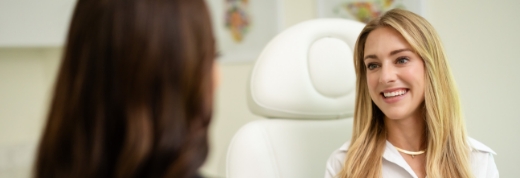Most of us know what it feels like to blush, usually as the result of feeling embarrassed or self-conscious. When your face appears flushed for weeks or even months at a time, that may point to a deeper issue. Prolonged redness of the face can often be attributed to a condition known as rosacea.
Rosacea is generally harmless but can have a negative impact on your self-confidence. The good news is that there are treatment options that can help manage the symptoms of rosacea.
Rosacea Defined
What is rosacea? Rosacea is a skin condition that is typically characterized by blushing or flushing. Rosacea may also involve the appearance of blood vessels on the face, or even the development of pus-filled lesions.
This is a cyclical condition, which means that it comes and goes. Patients who have rosacea may have a flare-up that lasts for weeks or months, only to subside for a while. Rosacea is not curable, but there are many treatments that can safely and effectively hold rosacea symptoms in check.
Meet Our Team
At the Wisconsin Institute of Plastic Surgery, our dermatology physician assistants, Colleen Van Egeren, PA-C and Megan MacCarthy, PA-C, have 34 years of combined experience treating various skin conditions. As dermatology specialists, they would love to talk with you about your needs and recommend a skincare treatment program just for you.
Diagnosing Rosacea
Rosacea can be challenging to diagnose, as its symptoms can sometimes seem like a naturally “ruddy” appearance. Additionally, the pus-filled lesions that some patients experience can be easily mistaken for regular acne.
When you join us for a consultation appointment, one of our providers will talk with you about your medical history, and also perform a careful visual assessment of the face. Usually, this provides enough information for an accurate diagnosis and the development of a clinical treatment plan.
What Causes Rosacea?
While scientists are not totally clear on what causes rosacea, it is generally assumed that rosacea stems from an overactive immune system, environmental conditions, genetics, or some combination of these factors.
Rosacea flare-ups may be triggered by any number of external factors. A few of the most common triggers include:
- Hot drinks
- Spicy foods
- Consumption of alcohol (particularly red wine)
- Extremes in temperature
- Exposure to the sun
- Exposure to wind
- Intense emotions
- Vigorous exercise
What Are the Symptoms of Rosacea?
Rosacea has many common signs and symptoms, including:
- A blushing/flushed facial appearance
- Small blood vessels and veins on the face or the nose
- Swollen lesion, often resembling acne outbreaks
- Tenderness or burning in the affected areas
- Dry or irritated eyes
- Slight enlargement of the nose
Any of these symptoms may be grounds for seeking a clinical diagnosis and treatment.
How to Treat Rosacea
There is no known cure for rosacea, but there are a number of safe and effective treatments that can keep symptoms at bay. Your skincare specialist will recommend a treatment based on the severity of your flare-ups, as well as other factors.
Types of Rosacea Treatments
The three primary options for treating rosacea include:
- Topical treatments. Medicated creams and gels may reduce the appearance of rosacea symptoms and can sometimes show results in mere hours.
- Oral medications. Your provider may suggest either oral antibiotics or oral acne medications in order to lessen rosacea symptoms, particularly bumps and lesions.
- Laser treatments. Laser therapy can be a safe, non-surgical way to lessen the appearance of veins and blood vessels.
What to Expect from Your Rosacea Treatment
What will your first rosacea appointment be like? Here is a summary of what you can expect when you join us for treatment near Oshkosh, WI.
What is the First Appointment Like?
During your initial appointment, your skincare specialist will ask you some questions about your medical history, and also perform a visual examination of your symptoms. Your provider will confirm the diagnosis, then walk you through some of the different treatment options that are available to you. Most of the time, patients are able to begin treatment during their very first visit.
What Happens After Treatment?
We will provide you with some home remedies you can use to minimize rosacea flare-ups. Common examples include:
- Making lifestyle changes, identifying and avoiding the things that cause your flare-ups.
- Ensuring the right protection against sun damage.
- Using gentle and non-abrasive cleansers on your face.
How Many Rosacea Treatments Will I Need?
The number of treatments you need will depend on the type of treatment your dermatology specialist recommends, plus the severity of your symptoms. For laser therapy, expect at least three sessions. Medications are often used on an ongoing basis in order to keep rosacea symptoms from progressing.
Get Rosacea Treatment near Oshkosh, WI
As you seek treatment for rosacea, we invite you to meet with our team of dermatology specialists here at the Wisconsin Institute of Plastic Surgery. Our specialists have over 32 years of combined training in skincare and are ready to address your skin concerns. Learn about the other dermatology services we offer near Oshkosh, WI and schedule a consultation with us at (920) 944-6614.

